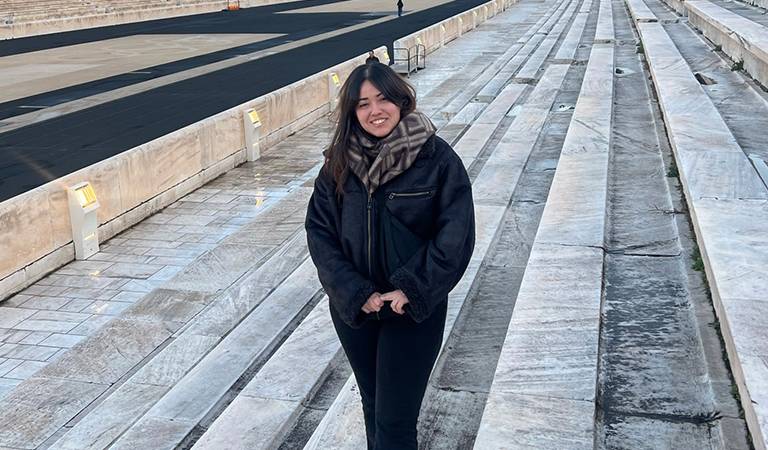Sara Khachatourian, MSc Environment, Politics and Society
Meet Sara, a student on our MSc Environment, Politics and Society course and recipient of the UCL Masters Bursary.

11 April 2024
She tells us about how the bursary helped her realise her goals of continuing her studies, exploring theories and ideas from across the Department and, eventually, pursuing her dream of working in sustainability, and more specifically human rights.
Why were you interested in studying for an MSc in Environment, Politics and Society (EPS)?
“I think what initially drew me to EPS was the wide array of different modules available for us to choose from.
“I knew from doing my undergraduate in Geography at UCL, that I enjoyed learning about lots of different aspects of Human Geography, be that within geopolitics, postcolonial studies or environmental studies.
“By choosing EPS, I knew that I would be able to continue exploring new theories and ideas to help me understand what interested me the most.
“The fact we were able to pick modules from the other Geography Master’s courses such as Global Migration or Urban Studies, meant my options never felt like they were limited.”
What was it that encouraged you to choose UCL to study it in?
“One factor that definitely influenced my decision to continue at UCL was that I knew that, particularly within Geography, there was a lot of flexibility given to us when selecting modules.
“Not only are we able to pick from a wide selection of modules within the Department, but we are also allowed to pick a module from any other department at UCL.
“I myself ended up picking the module Food and the City from the Bartlett Development Planning Unit.”
“Another reason would be the lecturers. I knew from having already been in the Department since my undergrad that the support I would get from everyone during office hours would be great and help me succeed.”
Can you tell us about the UCL Masters Bursary?
“The Masters Bursary is a £10,000 bursary offered to prospective students looking to study a full-time or part-time Master’s at UCL.
“For me, it was a great help as it meant I was allowed to realistically consider doing a Masters.
“It meant I didn’t have to worry about costs and allowed me to focus completely on learning and growing my academic interests.
“I would greatly encourage anyone wanting to continue their studies to take a look into this and also the many other bursaries and scholarships available!”
What were the most interesting or engaging things you learned on the course?
“It’s really quite difficult to pick just a few interesting things I learned on the course as I genuinely enjoyed it all.
“I think the two modules I particularly enjoyed were Migratory Activism, Creative Citizenship, led by Tom Western and Precarious Urban Environments led by Tatiana Thieme.
“Both these modules were engaging and offered creative forms of assessments.
“For Tom's module, we learned how to create an audio piece where we discussed a movement or protest we were interested in, and for Tatiana's we learned how to conduct our own mini ethnography, something I had never done before.”
Can you tell us about any particularly memorable experiences from your time as a Masters student with us?
“The most memorable experience I had would have to be my dissertation.
“Here, I was able to truly engage with my personal interests in art, decoloniality and environmental politics.
“Despite it being incredibly daunting, it really was one of the most rewarding pieces of work I’ve done.
“What made it even more memorable was the immense support I received from my supervisor Kate Dawson.
“Her knowledge and guidance, particularly at points where I was struggling, is something I will always be grateful for."
What do you hope to do in the future?
“In the future, I hope to work in sustainability with a focus on human rights.
“These fields combine my interest in not only protecting the environment but also the communities and people that live within it.”
Would you recommend studying Environment, Politics and Society in the Department and why?
“I would definitely recommend studying EPS here.
“The broad nature of the course means that you can learn about so many different things and later choose which parts interest you the most.
“The support from all the staff as well truly helps motivate you to want to gain a deeper understanding of what you are interested in.”
More Information
Interested in following in Sara’s footsteps? Find out more about our MSc Environment, Politics and Society course and see our other degrees in the Study section.
 Close
Close

